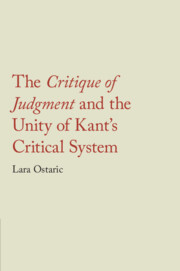
-
Select format
-
- Publisher:
- Cambridge University Press
- Publication date:
- August 2023
- August 2023
- ISBN:
- 9781009336833
- 9781009336857
- 9781009336864
- Dimensions:
- (229 x 152 mm)
- Weight & Pages:
- 0.58kg, 298 Pages
- Dimensions:
- (229 x 152 mm)
- Weight & Pages:
- 0.434kg, 298 Pages
- Subjects:
- Eighteenth-Century Philosophy, Philosophy
You may already have access via personal or institutional login- Subjects:
- Eighteenth-Century Philosophy, Philosophy
Book description
In this book, Lara Ostaric argues that Kant's seminal Critique of Judgment is properly understood as completing his Critical system. The two seemingly disparate halves of the text are unified under this larger project insofar as both aesthetic and teleological judgment indirectly exhibit the final end of reason, the Ideas of the highest good and the postulates, as if obtaining in nature. She relates Kant's discussion of aesthetic and teleological judgment to important yet under-explored concepts in his philosophy, and helps the reader to recognize the relevance of his aesthetics and teleology for our understanding of fine arts and genius, the possibility of pure judgments of ugliness, Kant's philosophy of history, his philosophy of religion, and his conception of autonomy. Ostaric's novel and thoroughly integrative presentation of Kant's system will be of interest not only to Kant scholars but also to those working in religious studies, art history, political theory, and intellectual history.
Reviews
‘Ostaric's book presents a master class in Kant. Drawing widely from across Kant's corpus, she presents a compelling interpretation of the unity of the third Critique through a novel examination of how the text answers the demand for reality to conform to our moral aims. This book is an important resource for anyone interested in understanding Kant's system, the unity of reason, and the third Critique in particular.'
Kristi Sweet - Texas A&M University
Contents
Metrics
Altmetric attention score
Full text views
Full text views help Loading metrics...
Loading metrics...
* Views captured on Cambridge Core between #date#. This data will be updated every 24 hours.
Usage data cannot currently be displayed.
Accessibility standard: Unknown
Why this information is here
This section outlines the accessibility features of this content - including support for screen readers, full keyboard navigation and high-contrast display options. This may not be relevant for you.
Accessibility Information
Accessibility compliance for the PDF of this book is currently unknown and may be updated in the future.


